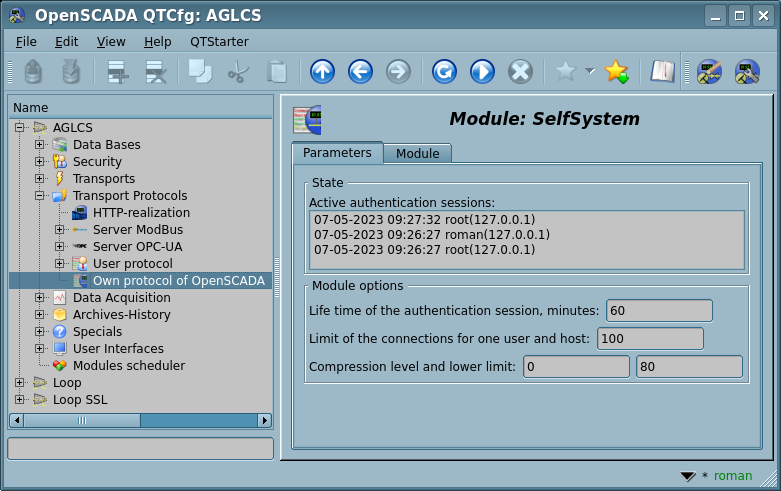| Модуль | Имя | Версия | Лицензия | Источник | Языки | Платформы | Тип | Автор | Описание |
|---|---|---|---|---|---|---|---|---|---|
| SelfSystem | Собственный протокол OpenSCADA | 2.0 | GPL2 | prot_SelfSystem.so | en,uk,ru,de | x86,x86_64,ARM | Протокол | Роман Савоченко | Предоставляет cобственный протокол OpenSCADA основанный на XML и интерфейсе управления OpenSCADA. |
Модуль предназначен для отражения интерфейса управления OpenSCADA в сеть, с целью предоставления возможности внешним системам взаимодействовать с OpenSCADA, а также для взаимодействия между собой станций, построенных на основе OpenSCADA.
Первым опытом использования функций данного модуля стала поддержка возможности удалённой конфигурации одной OpenSCADA станции из другой, через сеть и посредством модуля конфигурации QTCfg.
1 The syntax of the protocol
The protocol is based on the "Request-Answer" method. The queries and their structure are given in the followed Table.
| Requests |
|---|
|
REQ: "SES_OPEN {user} {password}\n" |
|
REQ: "SES_CLOSE {ses_id}\n" |
|
REQ: "REQ {ses_id} {req_size}\n{command of the control interface}" |
|
REQ: "{Error sequence}" |
The protocol supports the ability of the traffic compression. Only the Control Interface data command of the control interface and result of the command of the control interface are compressed. The fact of receipt of a compressed request or response is determined by the negative value of the req_size or the rez_size response. You can define the compression options on the configuration page of the module (Fig. 1). Response of the protocol input part is forced to the compression with level -1 (that is optimal) at the compressed requests.
![]() All those parameters can be configured individually for the transport, due to the module is first one supports configuration of the external sources in additional parameters of the transports.
All those parameters can be configured individually for the transport, due to the module is first one supports configuration of the external sources in additional parameters of the transports.
On this tab, you can:
- Familiarize the active authentication sessions.
- Specify life time of the authentication sessions, in minutes.
- Specify a connection limit for one user from one host.
- Specify the compression level and lower limit. Where range of the compression level is from 0 to 9 (0 - disable the compression, -1 - optimal compression level in performance and quality) and the lower limit is a threshold for the compression using and turning its off at small requests.
2 Internal structure of the output protocol
The internal structure is formed by the XML tree of the requests of the language OpenSCADA control interface with the reservation of the additional service attributes of the protocol in the root tag:
- rqDir — sign of the message sending through passing the procedure of the session opening (0-open session, 1-send immediately);
- rqUser — user;
- rqPass — password;
- rqAuthForce — force authentication update;
- conTm — force connection timeout, in milliseconds.
Результатом запроса также является XML дерево языка интерфейса управления OpenSCADA.
